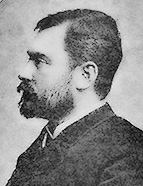

A historian, economist, anthropologist, and social and political critic, Oliveira Martins was one of the most influential thinkers in Portuguese historical and political culture from the 1870s onwards. He produced an extensive and multifaceted body of work that left a profound mark on the perception of Portugal, not only among Portuguese elites but also abroad, particularly in Spain and Brazil. His activities and writings provoked controversy and influenced not only the historians, critics, economists, and literary figures of his time and of the 20th century but also contemporary Portuguese political life.
Coming from an urban middle-class family, he was the third of nine children. His father, Francisco Cândido Gonçalves, was a civil servant and small landowner. On his mother's side, he was the grandson of Joaquim Pedro Gomes de Oliveira, a magistrate who was a member of the Junta Preparatória das Cortes [Preparatory Board of the Cortes] of 1820, Secretary of State for the Kingdom in 1823–24, and a friend of Mouzinho da Silveira (Guilherme d’Oliveira Martins , Oliveira Martins, uma biografia [Oliveira Martins: A Biography], p. 30).
A self-taught and compulsive reader with an insatiable interest in all aspects of human expression, Oliveira Martins began experimenting with various literary and essayistic genres from 1867: historical novels, dramas, essays on historical, political, and doctrinal reflection. However, these early attempts, of uneven quality, did not achieve significant success. In 1879, his intellectual trajectory shifted with the launch of the Biblioteca das Ciências Sociais [Library of Social Sciences], an editorial project entirely of his creation. Although it lacked doctrinal intentions and avoided the dominant systems of the time (positivism, evolutionism, spiritualism, etc.), it was partially influenced by some of these trends (Fernando Catroga, "História e ciências sociais em Oliveira Martins" [History and Social Sciences in Oliveira Martins], História da História… [History of History … ], 1996, pp. 117–159).
This work is financed by national funds through FCT - Foundation for Science and Technology, I.P, in the scope of the projects UIDB/04311/2020 and UIDP/04311/2020.
